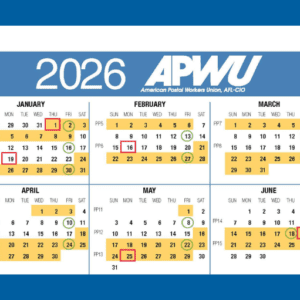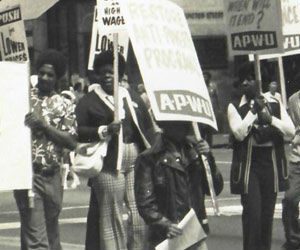September 16, 2020
100 Year Anniversary of Women’s Right to Vote
(This article first appeared in the September/October 2020 issue of the American Postal Worker magazine)
“Organize, agitate, educate must be our war cry.” – Susan B. Anthony, women’s rights advocate
The 19th Amendment extending the right to vote to women in the U.S. Constitution had its 100th anniversary on August 18. The crucial amendment states: The right of citizens of the United States to vote shall not be denied or abridged by the United States or by any State on account of sex.
The Amendment’s passage was the end of a very long battle fought by suffragettes for over seventy years, starting in 1848 in New York, at the Seneca Fall Convention. Thousands of women, and men, marched in the streets and held demonstrations across the country to change the law so women could vote, and through the right to vote help bring needed change to the status of women in general. Supporters wrote letters and columns published in newspapers and magazines with large readerships. They coordinated with their natural allies; Antislavery leader Frederick Douglass for example was a strong supporter of women’s suffrage. Tens of thousands of supporters spoke with the public – at rallies, public and private organizational meetings, and oneon- one in the streets and in social situations. During that struggle, many were arrested and assaulted.
The tragic Triangle Shirt Waist Fire in 1911, in which 150 working women perished due to unsafe conditions, sharpened the need for the women’s right to vote. Clara Leimlach, leader of shirt waist workers and suffragette succinctly made the case: “The manufacturer has a vote; the bosses have votes; the foremen have votes, the inspectors have votes. The working girl has no vote.
When she asks to have a building in which she must work made clean and safe, the officials do not have to listen. When she asks not to work such long hours, they do not have to listen… That is why the working woman now says that she must have the vote.”
However, while the 19th Amendment did give women access to the ballot, this access was not equal for all women across the country. In the segregated Jim Crow South, Black women faced poll taxes, literacy tests and other harsh efforts from lawmakers to keep them from voting. Those attempting to exercise their right to vote were often met with violence and arrest. They were also met with indifference from many white leaders in the suffragette movement.
Black women’s struggle for the right to vote continued for the next 40 years, before the 24th Amendment, banning poll taxes, was ratified in 1964, and the landmark Voting Rights Act of 1965, was signed into law, outlawing literacy tests and expanding federal oversight of voter registration.
Participate in the 2020 Federal Election
With the public Postal Service, unions and working families under attack, it is important that all APWU members exercise their democratic right to vote this fall.
The Legislative & Political Department has tools available on the union website for you to register to vote, find information about voting by mail in your state, and find your polling place if you choose to vote in person. Go to apwu.org/labor-2020, enter in your name and address to get started.
Also available on the page is a link to volunteer to work at polling places on November 3. With the pandemic, states are facing a record shortage of election workers. Together, we can help ensure access to the ballot box. Postal employees know what it means to serve this country during times of need. Help defend democratic rights by becoming an election poll worker.



